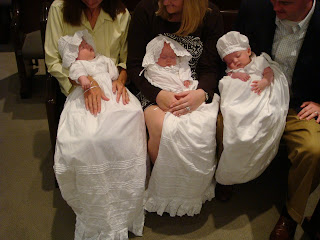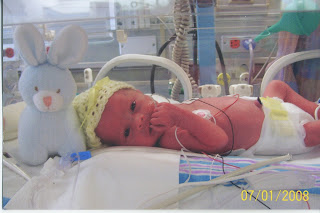Anyone with preemies knows that it is RSV season now. For most people without preemies, however, RSV season doesn't mean much. The purpose of this post is to educate everyone as to why we don't let people come visit our babies and why we don't let the babies out -- and won't until April! And then next year, the babies will be under house arrest from October until March -- AGAIN. I know everyone wants to see the babies and visit, and probably thinks we're being too overprotective, but we have good reason.
As a bit of background, and in layman's terms, when a pregnant woman reaches around 36 weeks, the baby gets the mom's immunities. Because we had the babies at 30 weeks, they never had the chance to get my immunities. The babies did and are still getting breastmilk, which is the only way they will get any of my immunities. So, the babies' immune systems are just not as developed as your average term baby's immune system. Additionally, no matter how healthy they look now, premature babies do not have nearly as developed lungs as other babies, so their respiratory systems are particularly subject to problems.
And that brings us to the biggest concern for premature babies: RSV. RSV stands for Respiratory Syncytial Virus. RSV season runs from October through March here in Alabama. Most all babies are infected with RSV by the time they are 2 years of age, and for term babies, children, and adults, RSV usually just results in a cold. For premature babies, however, RSV means hospitalization in the pediatric ICU with oxygen treatment, likely means long-term breathing problems such as asthma, and could cause DEATH. Each year 125,000 infants and young children are hospitalized with RSV, and approximately 2% of those hospitalized do not make it back out. For many of the 98% of infants and children who do return home, the experience with RSV will cause a lifetime of respiratory problems. Considering that RSV is relatively harmless to the vast majority of infants, 125,000 and 2% are BIG numbers for a preemie. You can read some thorough FAQs about RSV by clicking
here. Also, to read another triplet mom's blog on what RSV means to premature babies, complete with pictures, please click
here.
RSV is extremely contagious. The virus can live on our hands for up to 6 hours, and on hard surfaces for up to 12 hours. Gary and I usually have a party in December for some of our work friends, but we will not be having the party this year -- not because we're busy with triplets (which we are), but because we cannot have potential RSV germs brought into our home by unintending guests who may have the sniffles. Also, Gary and I exercise extreme caution at home. As soon as we walk in the door we wash our hands with medical grade soap and water before we touch anything in the house. We try to change clothes when we come home before we touch the babies. And we wash our hands and use hand sanitizer all day long, even at home. And we try to use hand sanitizer after touching one baby before we touch another, just to prevent spreading germs from one baby to another.
This is a real threat to our babies, and is recognized by healthcare professionals. For instance, our pediatrician calls us any morning that we have an appointment and makes sure that we are coming in as early as possible so that we will miss the sick kids and get into an exam room that hasn't been used that morning. As soon as we walk in the door, we are sent directly to an exam room by the receptionists. And we are even allowed to use the "backdoor" to get in and out if there are other kids around. At every visit, our pediatrician makes sure that we are keeping the babies inside and strictly limiting visitors to immediate family.
Almost two weeks ago, the babies received their Synagis shots, which are also known as RSV shots. This is not a vaccine, however. Those are shots that will help protect the babies' lungs in the event they do get RSV, and studies show that premature babies who have had the RSV shot have a shorter hospital stay by half. These shots cost approximately $1200 per baby per month -- and the babies will have to get these shots every month for 6 months. To show you how real a risk RSV is -- our insurance covers these shots 100% and even pays for a nurse to come to the house to give the babies these shots so that they don't have to get out and be exposed to RSV. I won't even get into what all prescription drugs are and are not covered by our insurance because it usually causes my blood pressure to rise, but I will say that if the fine folks at BCBS will pay $21,600 with no copays, then that should say something about RSV risks.
We don't like keeping the babies inside. We really want to get them out and show them off to everyone. And we don't like having to be so strict about visitors, and we don't like people thinking that we are overreacting and being overprotective. But premature babies are not like term babies, even once they get big and are healthy. After all we've gone through to get these babies home and healthy, we are not going to start taking risks now. I think you will all agree that house arrest for six months this year and six months next year is nothing compared to our babies' lives.




























.JPG)












